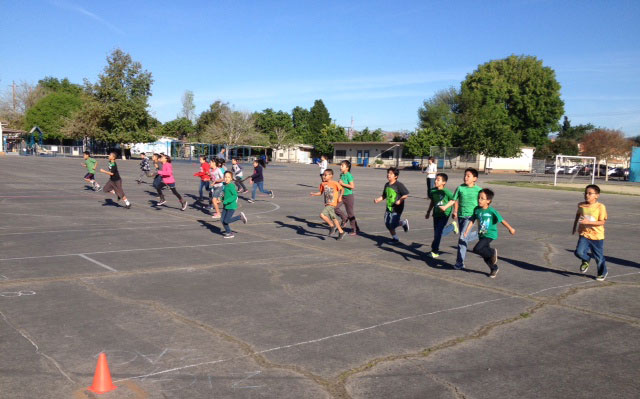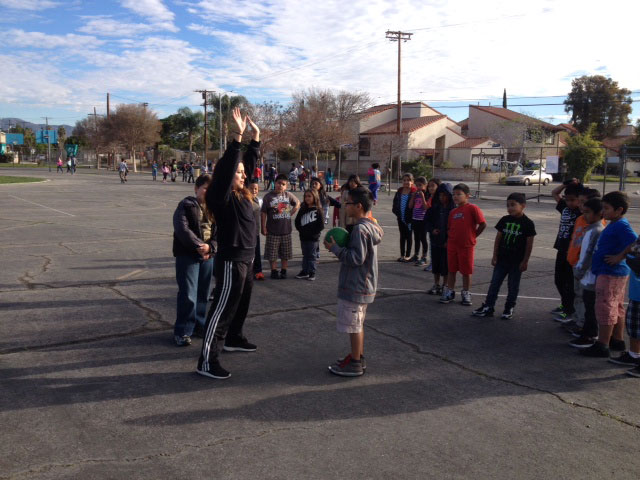CSUN Students Help Local School Kids Get Moving

Students at Hart Street Elementary School in Canoga Park work on cardiovascular fitness and strength with CSUN kinesiology students. Photo courtesy of Terry Sweeting.
Ready, set, go! California State University, Northridge kinesiology students are helping put more spring, bounce, jump, skip and run in the steps of local elementary school students this winter.
CSUN students and faculty are working with the schools thanks to a partnership with Dignity Health/Northridge Hospital, which received a $290,000 grant from the UniHealth Foundation to promote fitness and combat childhood obesity at Canoga Park and Hart Street elementary schools in Canoga Park. The one-year grant was renewed for the 2014-15 school year after a successful first run during the 2013-14 year. With funding from Dignity Health, the Coordinated Approach to Child Health (CATCH) project will continue into next year.
“The CATCH program plays a critical role in fighting the childhood obesity epidemic in our communities,” said Sylvia Alva, dean of the College of Health and Human Development. “Our faculty and students are providing innovative programs across the region — from the 100 Citizens program in local parks to Let’s Cook and Move in schools in the East San Fernando Valley. On the CSUN campus, we’re reaching preschool children, with nutrition students researching some of the more subtle ways nutrition can affect weight.
“We place a high priority on teaching children and families to eat nutritious foods and include fitness activity in their daily lives,” Alva said. “CATCH keeps kids from falling through the cracks when schools don’t have physical education teachers on their campuses.”
Hart Street and Canoga Park, like many local elementary schools, do not have physical education teachers on staff. Through this partnership, CSUN students teach physical education lessons to a total of 1,200 students in 51 classrooms each year.
“The CSUN students teach the physical education lessons, and they give the curriculum information to the classroom teachers so they can use it during the week,” said kinesiology professor Terry Sweeting, who helps coordinate the program. “We call it ‘mutual mentorship.’ It provides the opportunity for a classroom teacher, who also provides advice [to undergraduates] about classroom management and students. We’re trying to develop support systems for the teachers, so that when we leave there next spring, the physical education curriculum and equipment are in place, and the teachers can continue to teach the lessons.
“We’re trying to get them to see, when you get children moving, it complements what they’re doing in the classroom,” Sweeting added. “This is a part of the whole child and the learning experience.”
CSUN and its partners targeted the Canoga Park area because researchers noticed that the low-income community struggled with high rates of childhood obesity, Sweeting said. Faculty and graduate students in the university’s Marilyn Magaram Center for Food Science, Nutrition and Dietetics also are collaborating on the project. Under the supervision of former CSUN nutrition professor Michelle Barrack-Gardner, a few CSUN students teach nutrition education workshops after school at Hart Street and Canoga Park elementary schools, complementing the physical education curriculum that kinesiology students and teachers offer during the school day.
“[The children] taste different fruits and vegetables and learn to read food labels for nutrition information,” Sweeting said. “Children can be the ones to go home and teach their parents this information. They can have a huge influence at home.”
In the physical education lessons, CSUN kinesiology students focus on improving the kids’ cardiovascular fitness and strength — and honing fundamental movement skills such as throwing, jumping and kicking. For children in the upper grades, the undergraduates introduce activities such as soccer, basketball and rhythmic skills.
“It definitely has benefited the students, but also our teachers and the CSUN students as well,” said Curtis Johnson, principal of Hart Street Elementary. “They are providing a stronger physical fitness program that is well-established, that has a warm up, a cool down — it’s a proper fitness program.
“Through [the program], the teachers have realized that we have to teach the whole student,” Johnson said. “If they’re physically fit and leading healthy lifestyles, it’s going to help their learning as well.”
The elementary school kids look forward to the time outdoors with their CSUN student instructors as they learn new games and activities to play during recess. At the same time, the Hart Street and Canoga Park teachers are feeling more empowered to teach this subject, Johnson said.
CSUN project organizers said they hope the program leads to better health and well-being for families throughout Canoga Park.
“For some kids, that’s the only place they get to show what they’re excellent at — through movement,” Sweeting said. “The undergrads also are learning about the value of physical education at the elementary school level and the value of getting a degree in this area, where they can make an impact. We’re beginning to see ripple effects of the benefits from this project.”


 experience
experience